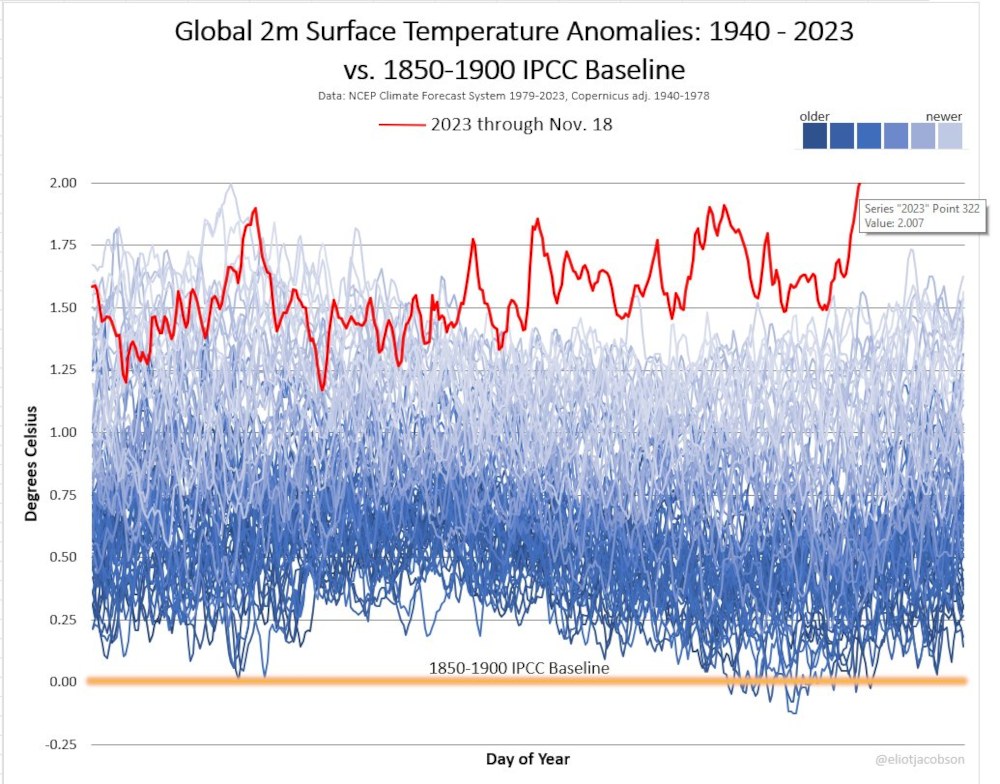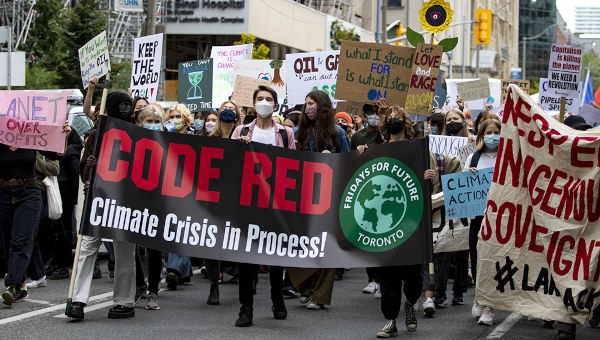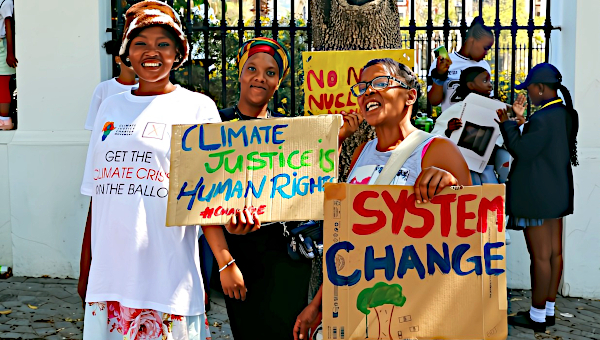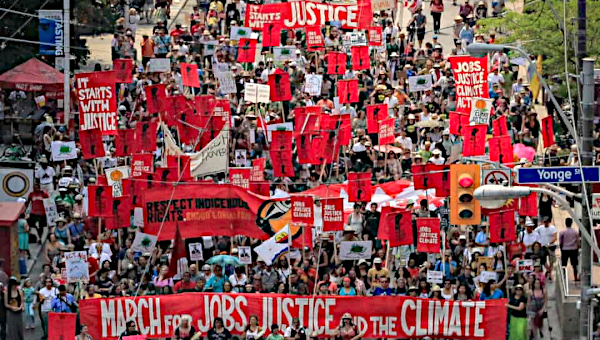COP28: We Need to Challenge the Power of Fossil Fuel Capitalism
Back in May, the World Meteorological Organization reported there was a 66% likelihood of exceeding the 1.5 degree Celsius threshold in at least one year between 2023 and 2027. On November 21, only nine days out from the start of COP28 in Dubai, in the United Arab Emirates (UAE), 350.org’s Bill McKibben shared an alarming graph (see below), showing that for the first time, global surface temperatures temporarily rose by 2⁰C, compared to pre-industrial levels. Climate scientists conclude that the remaining carbon budget for a 50% chance of keeping warming to 1.5 °C is around 250 gigatons of carbon dioxide (CO2) as of January 2023, equal to around six years of current CO2 emissions.
And yet, despite the fact that we are teetering on the edge of the climate cliff, capitalist governments are far from the drastic reductions in greenhouse gas emissions and carbon drawdown necessary to prevent this “temporary” temperature rise from becoming the norm, setting us well on the path to an unlivable planet for the majority of the world’s human and non-human population. On the contrary, emissions have steadily increased during the past few years.
The environmental destruction caused by wars, occupations and the military-industrial complex are compounding the crisis. The shift away from fossil fuels to renewable energy has suffered a setback because of this and the threat of a nuclear conflict is again hanging over us. Indigenous peoples continue to face land theft and dispossession as fossil fuel and mining companies (and the governments that rule on their behalf) embark on violent land grabs. As Greta Thunberg said in The Netherlands recently, “There is no climate justice on occupied land” and we wholeheartedly concur. The genocide we are witnessing is inextricably tied into the defence of fossil fuels by imperialist powers.
Island nations in the Pacific are now negotiating agreements for their populations to “migrate with dignity” as their lands become inundated with seawater and unfit for habitation.

COP: Time for Business Deals
And yet, COP28, the major global gathering of governments to reach agreement on tackling the crisis is being hosted by a petroleum state that is silencing voices of dissent. Climate journalists have now revealed that the UAE planned to use COP28 to sign oil deals – cynical act that exposes the flagrant hypocrisy of the capitalist class’s attitude to global warming.
The first COP was held in Bonn, Germany, in 1995. Despite 30 years of COP meetings, carbon dioxide (CO2), methane and nitrous oxide emissions continue to rise and slightly more than half of all cumulative global CO2 emissions have taken place since 1990.
Responsibility for this impending catastrophe lies overwhelmingly with the capitalist classes of the Global North. Loss and damage is suffered disproportionately by the poorest people in the world while the profits are accumulated by the corporations owned by the richest.
A recent study calculated that $192-trillion would be owed by rich countries to the Global South for the appropriation of their atmospheric fair shares by 2050. Meaningful reparations, paid for by the capitalist classes of the North, are necessary. They would include direct cash transfers, grant financing for mitigation and adaptation, debt cancellation and compensation to Global South countries who leave fossil fuels unexploited.
As long as the world remains divided into competitive nation states and market capitalism with its ruthless need to accumulate and make profit, the COP process is reduced to corporate greenwashing, the watering down of agreements by the big polluting countries and pledges that are routinely broken or outright ignored.
Many people, including Greta Thunberg, consider the COPs to be engaged in elaborate greenwashing and the call to boycott COP28 has grown louder, including from well-respected writer Naomi Klein. We need to take these two important voices seriously.
We also acknowledge that the climate justice movement, particularly in frontline countries, seeks to utilise whatever platform it can, including the COPs, to call out global capitalist governments and the climate-destroying industries they serve. In this respect, efforts to organise action on the “inside” combined with grassroots gatherings and mobilisations on the “outside” are also legitimate responses. However, the challenge remains to build a people’s climate movement strong enough to challenge the power of fossil fuel capitalism and to link up with other social movements to fight for an ecosocialist future. •

This article first published on the Global Ecosocialist Network website.





